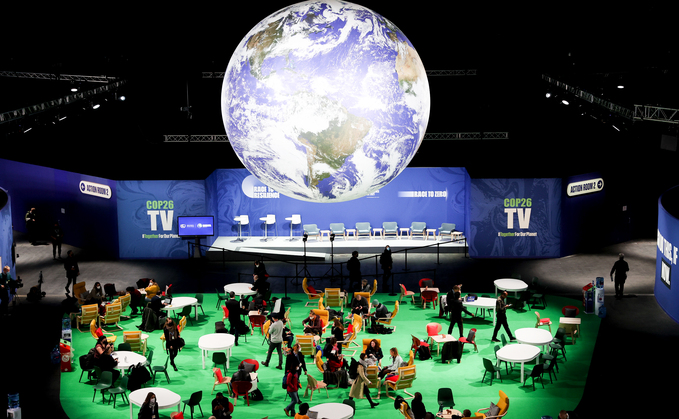
An installation on the COP26 campus in Glasgow | Credit: COP26
The international agreement that comes out of COP26 will not be ambitious enough, but it could still drive the real world progress that will slash fossil fuel demand over the coming years
The COP26 negotiations have entered their endgame.
Ministers and diplomats will now work around the clock in pursuit of an agreement that can credibly 'keep 1.5C alive'. The goal - as is so often the case with high stakes diplomacy - is a deal no-one likes, but everyone can live with. The problem is that an unambitious deal could very well prove to be one that billions of people literally can't live with.
Over the next 48 hours the negotiations will intensify further as red lines are revealed, angry words exchanged, and an attempt made to identify the 'landing zones' that could provide a workable compromise.
The usual suspects will attempt to block progress and dilute the final agreement. For that, read two broad camps: China, Saudi Arabia, Brazil and others objecting to anything they fear could constrain development or impose what they regard as sovereignty-threatening transparency requirements; and the treasuries of industrialised nations myopically opposing anguished calls for an increase in the flow of climate finance and adaptation funding to the developing world that would be both morally just and serve to bolster everyone's resilience and security.
The ghost at the feast - a certain orange-hued Florida-based frequently racist social media addict and the political party he has hijacked - casts a shadow over everything, undermining confidence the US political system can ever deliver on Joe Biden's ambitious net zero promises.
The negotiations remain delicately balanced and everything could all yet come crashing down in a crescendo of geopolitical enmity. But the general feeling currently is that an ambitious deal can be done.
Boris Johnson is said to be hitting up the world leader WhatsApp group urging them to seize an historic opportunity. Negotiators reckon the shape of a deal is starting to take shape. The "mood music" in the room where it happens is said to be considerably more upbeat than is typical for the closing days of a COP Summit. The hope is the major new agreement between the US and China announced yesterday evening can trigger breakthroughs overnight. More ambitious proposals on climate finance would quickly unlock progress on multiple other fronts - finance is the "solvent", as the Prime Minister declared yesterday afternoon.
Any final agreement is likely to represent a considerable step forward on the Paris Agreement - a cementing of that historic accord that provides firm foundations for further action. As Johnson put it in his inimitable style, Glasgow could mark "the beginning of the end of anthropogenic climate change" - an achievement that would be "the greatest gift we can bestow on our children and grandchildren and generations unborn".
But even if the current draft text was retained in its entirety it would still not be anywhere near as ambitious as it should be given the scale of the climate crisis we all face.
The world will leave Glasgow on track for 2.4C of warming, assuming governments do as they promised - an improvement on the projections from a year ago, but still a long way from the Paris promise of 'well below 2C', let alone 1.5C. The sticking plaster will hopefully be provided by a largely voluntary framework for imploring nations to strengthen their decarbonisation plans at some point in the not too distant future. If you are being generous 1.5C may get out of the negotiating rooms alive, but it will be wheeled out on a stretcher.
It will also be a minor miracle if the references to phasing out coal and fossil fuel subsidies make it through the horse-trading phase of the negotiations, providing further cover for the many governments and businesses that want to keep investing in fossil fuel infrastructure that has to become stranded assets in short order if the goals of the Paris Agreement are met.
Where then are the causes for optimism? The answer lies, in part, in a Tesco delivery van.
Yesterday, the supermarket marked Transport Day at COP26 by revealing that Glasgow has become the first city in the UK where its entire delivery fleet has switched to electric vans. The intention is that by 2028 the company's entire home delivery fleet will be fully zero emission.
The move came on the same day as a sizeable coalition of governments and auto manufacturers signed up to a commitment setting targets to end the sale of internal combustion engines. The companies and countries that demurred risk clinging on to a dirty old technology no one wants anymore. An analysis from Bloomberg New Energy Finance today indicated that nearly a fifth of all 2020 passenger vehicle sales were in countries that now have an internal combustion engine (ICE) phase-out date, up from just five per cent in 2019. Nearly a third of the global passenger vehicle market is covered by manufacturer commitments to switch to EVs. Critical mass is being reached.
Elsewhere, the UK government announced all HGVs will have to be zero emission from 2040, the evocatively named Clydebank Declaration unveiled plans for new green shipping corridors, and new contracts were signed to boost market demand for low carbon aviation fuels.
Like the draft Glasgow negotiating texts, all these various initiatives and the hundreds more that have been launched over the past few weeks are still underpowered and lack the scale and reach needed to rapidly move the world on to a 1.5C compatible decarbonisation trajectory.
But they also amount to genuine and rapid changes in the real economy that will in turn catalyse further and potentially exponential changes. It is the march of the S curves. The acceleration of the ambition loop. And it spins us back towards those negotiating rooms. Because much of this action - the plummeting clean tech costs, the surging green investment, the growing public support - has been aided by the Paris Agreement and the signal it sent to markets around the world that the net zero transition was both inevitable and desirable.
Some of the diplomatic teams in Glasgow will now seek to axe any mention of phasing out fossil fuel subsidies and hit back at calls to move beyond hydrocarbons. But meanwhile a fleet of supermarket delivery vans are already delivering what the high ambition coalition of countries want to see: real world changes that improve people's lives and communities, boost economies, and, crucially, obliterate fossil fuel demand.
If governments and businesses do even half of what they have said they will do over the next decade, large chunks of fossil fuel infrastructure will become economically unviable and emissions will start to fall. The blockers and the laggards will be left badly exposed, in every sense of the word. From there a virtuous and accelerating circle is possible that results in surging clean tech adoption and the end of the fossil fuel era.
If diplomats can deliver an ambitious agreement in Glasgow, one that mobilises increased levels of climate finance and adaptation funding and clearly signals that national climate action plans will be strengthened soon in pursuit of 1.5C and net zero emissions then the Summit will have delivered on its goals. Like the Paris Agreement it will constitute an accord where, if you read between the lines, it becomes clearer than ever that betting on polluting business models is a losing bet.
The world may not get what it wants from Glasgow, but it might just get what it needs.
This article first appeared as part of BusinessGreen's Overnight Briefing.










